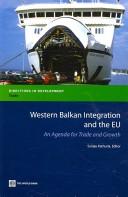| Listing 1 - 5 of 5 |
Sort by
|
Book
ISBN: 9780230239722 0230239722 1349316229 9786613067623 0230306314 1283067625 Year: 2011 Publisher: Houndmills: Palgrave MacMillan,
Abstract | Keywords | Export | Availability | Bookmark
 Loading...
Loading...Choose an application
- Reference Manager
- EndNote
- RefWorks (Direct export to RefWorks)
Regionalism --- European cooperation --- Balkan Peninsula --- Foreign relations --- Economic integration --- European cooperation. --- International cooperation. --- Foreign relations. --- RegionalismBalkan PeninsulaForeign relations. --- Regionalism - Balkan Peninsula --- Balkan Peninsula - Foreign relations --- Balkan Peninsula - Economic integration
Book
ISBN: 0821382594 9786612502200 0821382667 1282502204 Year: 2010 Publisher: Washington, D.C. : World Bank,
Abstract | Keywords | Export | Availability | Bookmark
 Loading...
Loading...Choose an application
- Reference Manager
- EndNote
- RefWorks (Direct export to RefWorks)
The Southeast Europe (SEE) region comprises a group of countries with a common objective, and prospect, to become members of the European Union (EU). To achieve the goal of EU membership, these countries have pursued closer integration with the EU as well as with each other. In December 2006, the SEE countries, and Moldova, signed the Central European Free Trade Agreement (CEFTA), a comprehensive free trade agreement that aims to fully liberalize trade in the region as well as to achieve greater cooperation in a number of trade-related areas. This book is part of the World Bank's efforts to un
Balkan Peninsula -- Economic conditions. --- Balkan Peninsula -- Economic integration. --- Central European Free Trade Agreement (Organization). --- Economic History --- Business & Economics --- Regionalism --- Central European Free Trade Agreement (Organization) --- Balkan Peninsula --- Economic conditions. --- Economic integration. --- CEFTA --- Środkowoeuropejska Umowa o Wolnym Handlu (Organization) --- Balkan States --- Balkans --- Europe, Southeastern --- Southeastern Europe --- Human geography --- Nationalism --- Interregionalism

ISBN: 9781845114602 1845114604 1780764065 9786612881039 1441676546 6000043651 1282881035 0857712470 9781780764061 Year: 2010 Volume: 9 Publisher: London: Tauris Academis Studies,
Abstract | Keywords | Export | Availability | Bookmark
 Loading...
Loading...Choose an application
- Reference Manager
- EndNote
- RefWorks (Direct export to RefWorks)
Civil society --- European Union --- Balkan Peninsula --- European Union countries --- Relations --- Economic integration --- Politics and government --- Social conditions --- Balkan Peninsula -- Economic integration. --- Balkan Peninsula -- Politics and government -- 1989-. --- Balkan Peninsula -- Relations -- European Union countries. --- Balkan Peninsula -- Social conditions. --- Civil society -- Balkan Peninsula . --- Europa ̈ische Union. --- European Union -- Balkan Peninsula. --- European Union countries -- Relations -- Balkan Peninsula . --- Jugoslawien. --- Nachfolgestaaten. --- Europäische Union. --- Balkan States --- #SBIB:327.7H233 --- #SBIB:328H271 --- Social contract --- Europese Unie: externe relaties, buitenlands- en defensiebeleid (ook WEU) --- Instellingen en beleid: Balkanstaten: Roemenië, Bulgarije, Ex-Joegoslavië, Albanië e.a --- E.U. --- Balkans --- Europe, Southeastern --- Southeastern Europe --- EU countries --- Euroland --- Europe --- Economic integration. --- Social conditions. --- Politik. --- Civil society - Balkan Peninsula --- Balkan Peninsula - Relations - European Union countries --- European Union countries - Relations - Balkan Peninsula --- Balkan Peninsula - Economic integration --- Balkan Peninsula - Politics and government - 1989 --- -Balkan Peninsula - Social conditions
Book
ISSN: 10177566 ISBN: 9789291981151 929198115X Year: 2007 Volume: 104 Publisher: Paris Institute for Security Studies
Abstract | Keywords | Export | Availability | Bookmark
 Loading...
Loading...Choose an application
- Reference Manager
- EndNote
- RefWorks (Direct export to RefWorks)
Regional cooperation in the Western Balkans is an issue that has been much discussed. Nor has there been any shortage of action to match the talk. As a result, the countries of the region are today much more closely connected through various cooperation schemes than they were seven years ago. This is a success that should not be underestimated. If the present situation is compared to the one prevailing in 2000 – an annus mirabilis for the region as democratic changes took place first in Croatia and later in Serbia – clearly a lot of positive developments have taken place. Today the Western Balkans is an emerging region in transition, where economic development is underway and in which cooperation is increasingly seen as an obvious choice, rather than a last-resort option. Yet not everything is rosy. There are still acute social problems within the Western Balkans – delayed integration and the violent conflicts that followed the disintegration of Yugoslavia mean that today the region is blighted by severe unemployment, poor infrastructure, drug and human trafficking and other forms of organised crime. To make matters worse, the EU integration process seems to have been plagued with controversy about ‘absorption capacity’, ‘integration capacity’ and ‘enlargement fatigue’, leading citizens of the countries in the region to question whether the prospect of membership promised to them is in fact a credible one. This Chaillot Paper tries to provide a background against which both cooperation among the countries of the region and their integration in the EU, as major vectors of long-term stabilisation, can be better understood but also more effectively encouraged. Focusing on the forms of cooperation that exist in the region, and also on the different expectations among external actors encouraging and regional actors participating in this, it highlights the importance of successful future cooperation and integration in a region that has traditionally known little of either.
Regionalism --- European Union --- Balkan Peninsula --- Foreign relations --- Economic conditions --- Politics and government --- Economic integration --- #SBIB:327.5H10 --- #SBIB:328H271 --- Human geography --- Nationalism --- Interregionalism --- Strategie: algemeen --- Instellingen en beleid: Balkanstaten: Roemenië, Bulgarije, Ex-Joegoslavië, Albanië e.a --- E.U. --- Balkan States --- Balkans --- Europe, Southeastern --- Southeastern Europe --- Economic conditions. --- Economic integration. --- Politics and government. --- Regionalism - Balkan Peninsula --- Balkan Peninsula - Foreign relations - European Union countries --- Balkan Peninsula - Economic conditions --- Balkan Peninsula - Politics and government --- Balkan Peninsula - Economic integration

ISBN: 0821374729 9780821374726 9786611385859 1281385859 0821374737 9780821374733 Year: 2008 Publisher: Washington, D.C. : World Bank,
Abstract | Keywords | Export | Availability | Bookmark
 Loading...
Loading...Choose an application
- Reference Manager
- EndNote
- RefWorks (Direct export to RefWorks)
This title explores ways for the Western Balkan countries to improve growth prospects through deepening of regional integration and improving selected elements of their investment climate. It analyzes areas relating to trade in goods and services, regional integration, and selected aspects of the investment climate. It suggests that countries in the region could reap sustained growth payoffs by focusing on deepening regional integration, improving human capital, reducing telecommunication costs and pre-empting energy shortages.
Economic conditions. Economic development --- International economic relations --- European Union --- Balkan Peninsula --- Balkan Peninsula -- Commerce. --- Balkan Peninsula -- Economic integration. --- Balkan Peninsula -- Economic policy. --- Economic development. --- Exports. --- Investments, Foreign -- Balkan Peninsula. --- Economic development --- Exports --- Investments, Foreign --- Business & Economics --- Commerce --- International Commerce --- Economic History --- Commerce. --- Economic integration. --- Economic policy. --- -Exports --- -Investments, Foreign --- -330.9496 --- Capital exports --- Capital imports --- FDI (Foreign direct investment) --- Foreign direct investment --- Foreign investment --- Foreign investments --- International investment --- Offshore investments --- Outward investments --- Capital movements --- Investments --- International trade --- Development, Economic --- Economic growth --- Growth, Economic --- Economic policy --- Economics --- Statics and dynamics (Social sciences) --- Development economics --- Resource curse --- -Balkan Peninsula --- -Balkan States --- Balkans --- Europe, Southeastern --- Southeastern Europe --- Economic integration --- -Commerce --- Balkan States
| Listing 1 - 5 of 5 |
Sort by
|

 Search
Search Feedback
Feedback About UniCat
About UniCat  Help
Help News
News